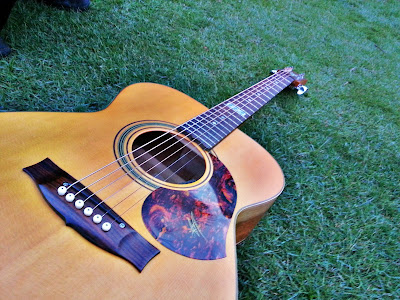Wood meets Steel
Many people ask me this question "Why acoustic guitar?" especially parents who are thinking of enrolling their kids for guitar classes. So here are my thoughts on, why?
 |
| My Maton Acoustic Guitar EBG808TE |
Acoustic
The fact that it's acoustic is by itself a plus point. You are able to bring it to different places and strum away without fussing over amplifiers and cables. Semi-acoustic guitar (Acoustic guitar with a pickup installed) is a smarter choice which enables the guitarist to not only play acoustically, but amplify the sound when necessary via the pickup.Steel and Nylon
Lets do a little comparison with the classical guitar.
Classical guitar used to be the favorite choice many years ago and there is still a vast majority of people learning classical guitar. Classical guitars are usually distinguishable by their wounded copper over the nylon strings and their unique head stalk.
To name a few benefits of learning classical guitar:
1. You'll learn plucking/fingerstyle right at the beginning.
2. Able to read notation/sightread pieces.
3. There are many different credentials for it.
4. If you enjoy Classical music, you'll learn loads of Classics pieces while you're at it.
 |
| A typical classical guitar |
Acoustic guitars are fitted with steel string wounded in bronze. It's much tougher to depress and it gives the guitar a more steely/pop/modern tone. It appeals to the younger generation who loves to strum and sing a tune quick and easy.
Benefits of learning acoustic guitar:
1. Easy and quick to learn
2. Widely used in modern songs
3. A favorite companion for the singer-songwriter
4. No examination required.
*The determination of the player him/herself determines how much they'll learn and progress in any musical disciplines.
Acoustic and Electric
The differences between an acoustic guitar and electric guitar are:
A = acoustic : E = electric
A. Generates sound without the need to plug into an amplifier.
E. Must plug the guitar into the amplifier to generate sound via a cable.
A. More suited for strumming and plucking
E. Usually used for soloing, riffs/licks, comping, and has a wide array of sound via the multi-effects pedal.
A. Harder to press due to the stiffness of the strings higher gauge (0.011-0.013mm).
E. Easier to press because it's usually strung with a lighter gauge of strings (0.09-0.010mm).
If you want to be a part of a rock, metal, jazz, pop, blues, band, the electric guitar is for you. In this day and age, there isn't a band without an electric guitar player (at least one).
 |
| Fender Stratocaster Electric Guitar |
Acoustic guitars are usually more for strumming a chord while singing to a tune, plucking/fingerstyle, and accompanying other musicians as part of the rhythm section. However, the acoustic guitar has gone through and is still going through a revolution in the way musicians approach it. Players like Chet Atkins, Tommy Emmanuel, Joe Robinson, Jerry Read, Andy Mckee, Jon Gomm has changed the entire ball game.
The Revolution
This is Jon Gomm playing "Passion Flower". A MUST WATCH!
He is using various unorthodox playing pattern such as right hand tapping, alternate tunings, knocking on the guitar to create a percussive feel, changing the pitch of the string by twisting the tuning knob as part of the melody, using various electric guitar effects pedals on the acoustic guitar to create ambiance, longer sustain, reverb, and SINGING on top of all the crazy maneuvers he's doing on the guitar.
Andy Mckee's song "Drifting" has been one of the pioneering songs to continue the revolution.
Best of both worlds
Acoustic guitar is sort of a blend between a classical and electric guitar. One will usually learn strumming (across the board), plucking/fingerstyle (classical), and also riffs/solos/licks that is mainly electric guitar in nature, on the acoustic guitar. Having learnt the acoustic guitar, I developed techniques that are both from the classical guitar and electric guitar at the same time.
Here's an example where Joe plays the acoustic guitar with various plucking and picking technique.
And here's my take on the acoustic guitar. Obviously, pales in comparison to these guitar heroes.
Conclusion
The conclusion is simple. Pick and choose which style you like the most which will then help you choose which type of guitars you'd purchase and learn. Practice very hard, diligently with much discipline at your instrument and be really good at what you do. Ultimately is about enjoying what you're playing. With that enjoyment comes fulfillment; and in the fulfillment, I hope it infuse you with more passion to learn and push yourself to a higher level to be even better at what you're good at already. There are many good musicians, but few are able to express/convey true emotion and feel in whatever they are playing.
